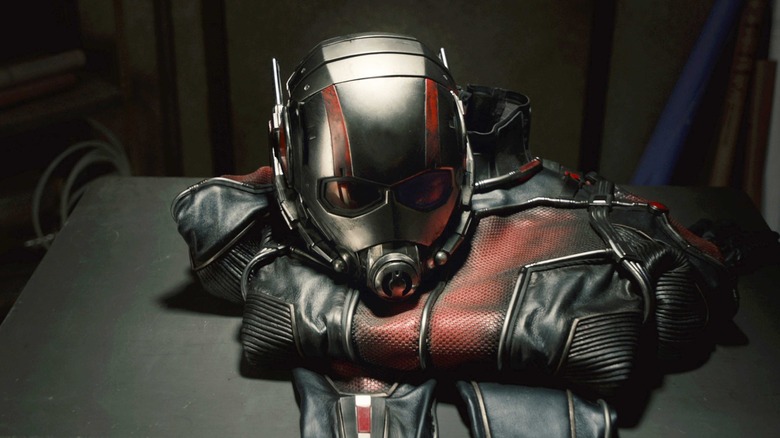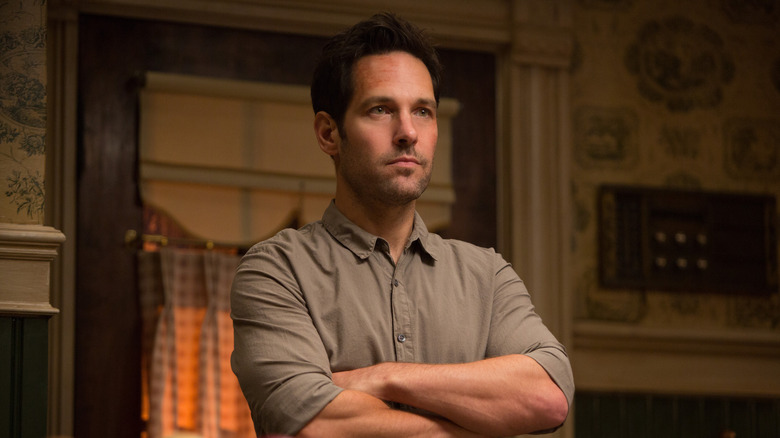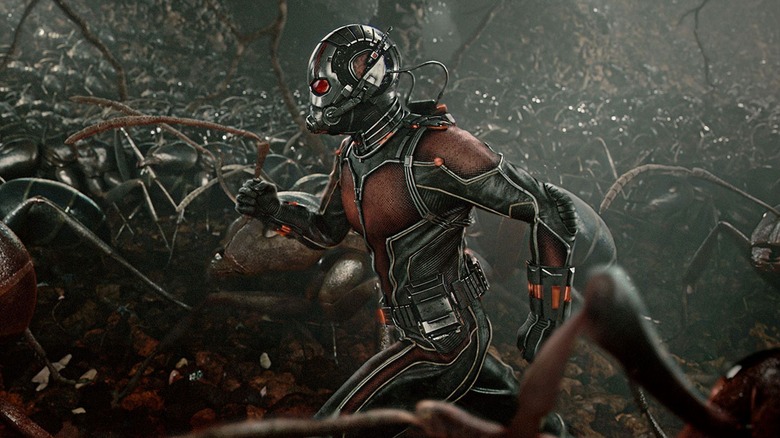10 Years Later, Edgar Wright's Ant-Man Remains Marvel's Greatest Missed Opportunity
The Marvel Cinematic Universe has been going strong for close to two decades now. It all dates back to 2008's "Iron Man." Directed by Jon Favreau, nobody could have expected Robert Downey Jr.'s turn as Tony Stark to build an empire that has led to well over $30 billion at the global box office, with Marvel Studios rapidly approaching its 40th feature film.
Though it may not get much credit, there was a moment in the summer of 2015 when it was clear that the MCU had hit a certain fever pitch with general moviegoers. That moment came when director Peyton Reed's "Ant-Man" hit theaters. By far one of the biggest swings Marvel took in terms of giving a character the spotlight who didn't have a guaranteed audience by any means, it became a sizable hit, taking in $519 million worldwide against a reasonable $130 million budget.
It helped catapult the already very popular Paul Rudd to another level of global superstardom. It gave the MCU yet another franchise to build upon, and it made Reed into a much, much bigger director than he'd previously been. And yet, 10 years removed, for all of the movie's success, there remains the sore thumb of it all. That sore thumb is director Edgar Wright, who after making beloved cult classics like "Shaun of the Dead" and "Hot Fuzz," spent years developing a version of "Ant-Man" that never saw the light of day.
A full decade later, Wright's version of the movie still feels like the MCU's biggest missed opportunity, and one that feels particularly relevant today. Wright spent years working on "Ant-Man," even appearing at one of Marvel Studios' earliest San Diego Comic-Con panels to tease his take on the character. He would get pulled into other projects, like "The World's End" and "Scott Pilgrim vs. the World," and Marvel's schedule would fill up with other projects, including everything from "Thor" to "Guardians of the Galaxy."
Ant-Man was a hit - but it could have been so much more
Wright would get pulled into other projects, like "The World's End" and "Scott Pilgrim vs. the World," and Marvel's schedule would fill up with other projects, including everything from "Thor" to "Guardians of the Galaxy." All the while, Marvel stuck with Wright and hyped up his vision, with the filmmaker waiting patiently in the wings.
Then it all went belly-up. Mere months before production was scheduled to begin, Wright and Marvel Studios parted ways over "creative differences." While very little has been revealed about Wright's script in the years since, he's a very distinctive director and, though it worked very well for them for a long time, Marvel Studios wasn't a filmmaker-first place. It was more of a plug-and-play situation for many of the directors who were hired, with rare exceptions like James Gunn on "Guardians," but even he had his frustrations tending to the larger universe.
In the weeks that followed, Marvel hired Reed, then best known for "Bring it On," in what seemed pretty transparently like a "gun for hire" situation. Credit where credit is due, Reed played ball and made the most of it, making the movie that Kevin Feige and Co. clearly wanted to make. It's hard, on paper at least, to argue against the results. Critics and audiences liked it well enough, and it was a hit by anyone's definition.
Even so, it's still hard not to wonder what Wright would have brought to it. This is something he was deeply passionate about and stuck with for the better part of a decade. What was Marvel so scared of? Isn't the whole point of sorely earned success to take creative risks? Why not bet on the man who made one of the best zombie movies of all time, for heaven's sake? People very clearly went to see "Ant-Man" because they were sold on the MCU as a larger concern at that point. That could have been an opportunity to let a visionary like Wright do his thing, opening all kinds of doors for the future.
Instead, Marvel Studios and Disney played it maddeningly safe.
Marvel is still afraid to truly commit to a creative vision, it seems
To be clear, this is not me talking poorly about "Ant-Man" as it exists. It's a perfectly fine movie existing somewhere in the middle of the pack for the MCU. What I am saying is that it's difficult not to see that Wright A) cared deeply about the project and had a take on it, and B) that Marvel Studios backed away from his take because it didn't gel with their larger vision.
This is where the "cinematic universe" of it all became something of an enemy to the individual movie in question. This is also to say nothing of how crappy it was that Marvel Studios stuck by Wright for all of those years, only to finally cut ties at the last minute. That remains, as the kids might say, not cool, bro.
It also doesn't help that "The Avengers" director Joss Whedon praised Wright's script and mourned the filmmaker's departure from the project. He wasn't alone, and it's easy to see why. But a decade removed, this moment has truly taken on new meaning. It's no secret that the MCU has struggled in recent years, with movies like "Eternals," "Black Widow," "Quantumania," "The Marvels," "Captain America: Brave New World," and "Thunderbolts" all struggling to live up to commercial expectations.
During that stretch, the likes of "Eternals" director Chloe Zhao ("Nomadland") and "The Marvels" director Nia DaCosta ("Candyman") had to find out the hard way what it's like to go into the MCU with a vision. Those visions were compromised during the process, and audiences largely shrugged at the final product. Might this have happened to Wright if he had tried to play ball?
In the here and now, it feels like bailing on Wright in favor of the safer option is haunting the MCU. The stuff that has truly clicked has either been massive event films like "Spider-Man: No Way Home" or stuff with a clear vision, like "Shang-Chi." Playing it safe appears to be hurting (or at least not helping) the MCU. In some ways, it feels like that "play it safe so we don't risk alienating the audience" mentality traces its roots back to this key decision 10 years ago.
The hope is that Marvel Studios realizes this and can perhaps lean into more creator-driven movies in the years to come, rather than keep their hands at 10 and 2 until the car runs out of gas.


